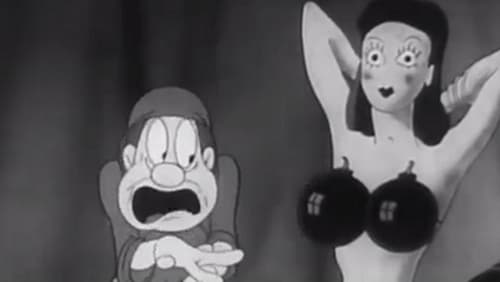Anamnesis (1969)
ジャンル : ドラマ, ロマンス
上映時間 : 16分
演出 : Frans Zwartjes
シノプシス
Film in three parts. A man and a woman, Trix Zwartjes and Lodewijk de Boer (Zwartjes’s regular actors) circle around each other in a house and outside at the water side. They attract and reject each other.

A woman plays with a bird as the camera's gaze is drawn to her legs.

A man in drag reaches for some sorbet and then eats it.

Frans Zwartjes' two visions of womanhood in Behind Your Walls have all the febrile frustration associated with his previous work. Flesh looks like crisp paper about to be despoiled, a torpid heat reduces movement to fidgets and hesitations. - MIFF

Four young men affected by psychological motorcar reactions and effluents that get more excited, crazy and freaked out as times passes.

Experimental film depicting military service in a grotesque way.

A comically ridiculously altered version of the classic tale, in which Don Quixote is victorious over his imaginary enemies and emits Tarzan-like yells of triumph.

A middle-aged man bare chest and wearing trousers, clears a shallow trench in the sand while a young woman draped in a long, flimsy veil looks on. The man leaves, but stays in the nearby wood at a watching distance, glancing at the girl divesting of her robe, sitting in the trench as if to sunbathe. She shifts positions a couple of times, but then the man returns, and starts covering her with sand. Unhappy, the girl gets up, picks a flask of lotion from the trench, and leaves with the man.

Frans Zwartjes and his wife explore their new home, and the sexual tension they've brought with them to it.

A homesick Pvt. Snafu learns that his family are almost as commited to the war efforts as himself.

Starring the color red, we see a chap in a blue shirt & blue baseball cap walking down a pink street (thanks to camera filters). Discarding the shirt he takes a nap in the sun, but soon sits up & introduces himself as Red. His missing blue shirt reappears & he goes for a walk looking at stop signs, because they're red, & walks past walls painted red, arriving home to look out the window with binoculars, presumedly at something red.

Zwartjes made many films without dialogue or sound. The music can however be very important. Zwartjes composes it himself, sometimes together with his brother Rudolf and Lodewijk de Boer. Audition is a fine example of a Zwartjes film with an important soundtrack. It is a visual improvisation of cinematography and acting. There is hardly a ‘story line’. A man and a woman watch another woman singing, predominantly in exciting black and white images.

A man leaves his wife and two daughters for work in a carpentry shop. At work, he initially refuses a beer with lunch, then gives in. After work, two friends take a little while to convince him to go for a refreshing malt beverage, then to have another and another....

Happy sunshine-bottling gnomes battle gloomy swamp-dwellers.

An abstract animation by Norman McLaren, who was born in Scotland in 1914. His interest in filmmaking began early in life after he became acquainted with works by the great Russian filmmakers Eisenstein and Pudovkin and the German animator Oskar Fischinger.

Close up we see pistons move up and down or side to side. Pendulums sway, the small parts of machinery move. Gears drive larger wheels. Gears within gears spin. Shafts turn some mechanism that is out of sight. Screws revolve and move other gears; a bit rotates. More subtle mechanisms move other mechanical parts for unknown purposes. Weights rise and fall. The movements, underscored by sound, are rhythmic. Circles, squares, rods, and teeth are in constant and sometimes asymmetrical motion. These human-made mechanical bits seem benign and reassuring.

Pvt. Snafu thinks he's too smart to get caught by an enemy booby trap, but he soon finds that the traps are alluring and that he is every bit the booby.

Finished shooting in 1962, the movie’s cast was almost the same as its crew. With a bunch of experimental symbols such as skinny human body, clock and goat flow from one scene to another, the film explores the question of whether a man is a prisoner of time.










